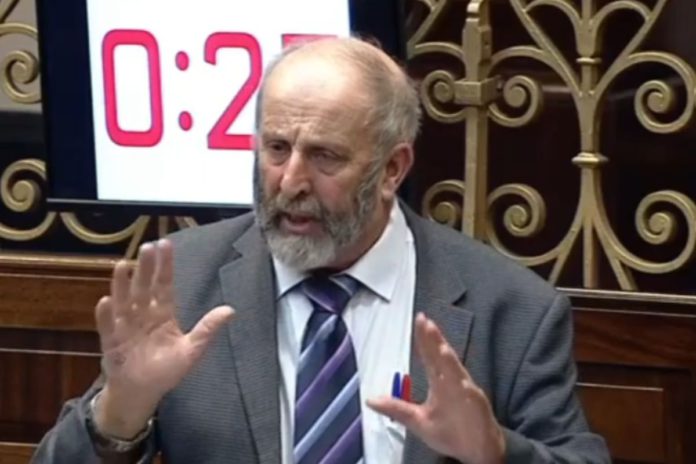If diesel prices rise further, work will stop, and wheels will grind to a halt.
That is the warning Independent TD, Danny Healy-Rae, issued during a Dáil debate on the supplementary budget for rural communities and farmers on Wednesday, February 23rd, 2022.
He told the house that workers are suffering because of increasing fuel costs. Therefore, “many cannot carry on and will not survive”.
He went on to say that “farmers are terrified; many do not know how or if they will be able to continue”.
Diesel prices
“The cost of agri-diesel has increased from 38c to more than €1 since this time last year,” the TD explained.
He highlighted that feed costs have doubled, and fertiliser costs have trebled. Healy-Rae added that urea fertiliser cost €330 per tonne last July and is now priced at €940, but it is difficult to secure supplies.
He asked the government to consider dropping the anti-dumping tariff of €50 and handing farmers a subsidy of €100 per tonne towards the “savage” cost of fertiliser.
The deputy said this would help keep the cost of food down for homeowners.
Transport industry
He then told the house that commercial lorry owners in the transport industry are “at breaking point”.
He said they were outside the gates of Leinster House months ago and made their case in an “ordinary and respectful” manner.
“I asked the Taoiseach to forgo the extra VAT and excise duties that the government was accruing from the increased fuel costs and give the sector a chance. The government has done nothing.”
“That was three or four months ago. The government took in an extra €3 billion in VAT returns in 2021 compared with 2020. That was €1 billion more than its own projections. Would it give some bit of that money back to people to let them continue operating?”
He highlighted that truck owners face several other cost increases for tyres, batteries, AdBlue, and other wearing components.
“Their prices have doubled. To top it all, truck owners cannot get parts owing to a fierce delay because of Brexit.”
Fuel allowances
The deputy stressed that it is a “scandal” that people on illness benefit, jobseeker’s benefit, maternity benefit, disabled benefit, enhanced illness benefit, or occupational injuries benefit do not qualify for the fuel allowance.
He said that a pensioner living with a cancer patient, who receives illness benefit, will not qualify for the fuel allowance.
“Even though that person has paid the contributions entitling him or her to get the benefit, he or she cannot get the fuel allowance,” he said.
“I have raised this before, and the government has done nothing about it. These are vulnerable people, many of whom are sick and in a bad way.”
“The government is talking about what it has done. It has done nothing for these classes of people.”
“Elderly people need heat in their homes to survive more so than younger people. They will perish in their homes if the government does not act to help them.”
He said this mini-budget should reverse the decision to increase the carbon tax in budget 2022 and beyond until the full impact of the energy crisis is “fully understood”.
He has called on the government to undertake a cost-benefit analysis by whatever parliamentary means necessary, including new legislation if required.
Furthermore, he said the mini-budget must reduce the excise duty on all motor fuel by at least 50% until the energy crisis abates.
Plan for rural Ireland
He called on the government to implement a “proper and common-sense” plan for rural public transport alternatives in every rural community.
He urged the government to ensure the purchase price point of electric cars is affordable to the ordinary motorist.
“The government should not be trying to force people away from diesel or petrol cars until it has a reasonable and practical alternative, which the electric car is not at present.”
“It must give over its codding. It knows it is wrong in that regard. People will adapt and change if it is practical.”
Furthermore, he believes the mini-budget must reduce the excise duty on petrol, which is currently 62.77c/L and on diesel, which is 51.9c/L, by at least 50% from now until the end of 2022.
He highlighted that this alone would save approximately €18 on a €100 fill of petrol or diesel for the regular motorist.
Besides, he said the mini-budget must reduce VAT on all motor fuels, electricity and home heating oil to below 5% until the end of this year.
“I appeal to the minister to do this. Otherwise, people cannot go on; they cannot continue indefinitely.”
“As has been said in this chamber, the price will shortly be more than €2 per litre. The government will have to do something.”
Concluding, he said government deputies should think of the people who elected them in rural Ireland people and the who always voted for them.
“Those people are changing their minds, and nothing will stop them from doing so,” he told the house.





